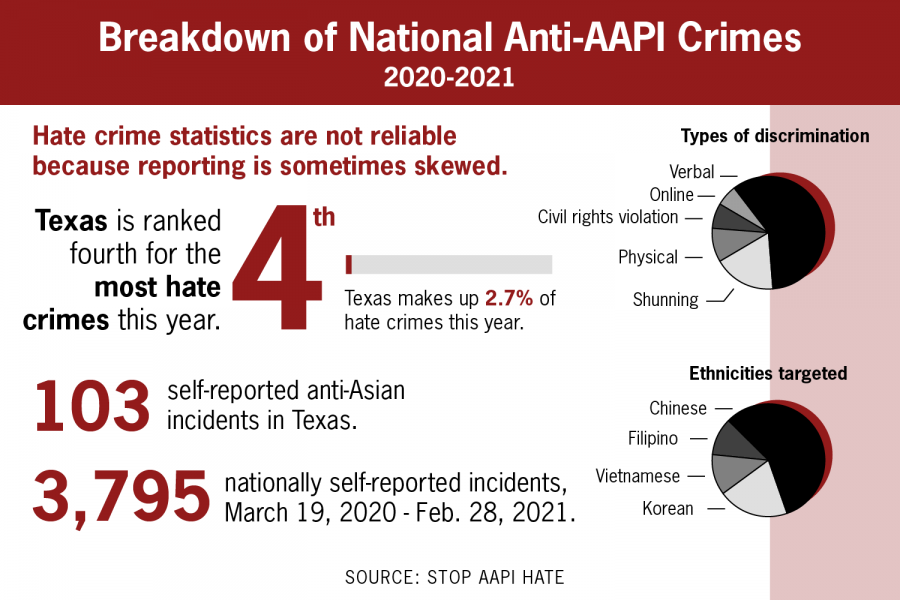UT’s Asian American community discusses recent Atlanta attacks and rise in anti-Asian discrimination
March 30, 2021
Trigger Warning: This story discusses anti-Asian hate crimes.
Anti-Asian hate crimes increased by nearly 150% in 2020 and on March 16, a shooting in Atlanta killed eight people, six of whom were identified as Asian women. At least four of those killed were of Korean descent. With the recent Atlanta attacks fueled by anti-Asian bias, Wenhong Chen, an associate professor at UT, said she feels the pain in her community acutely.
“I think for many people, this is the first time they realize the long history of Asian American racism in this country,” said Chen, an associate professor of media studies and sociology. “Asian Americans have been in this very precarious position since early on, since the very beginning, … and I sincerely hope this very sad moment can actually … lead to a national movement about Asian American history (and) Asian American future.”
Chen said as a first-generation Chinese immigrant, she relates to the six women who were murdered in Atlanta. She said anti-Asian hate crimes have been fueled by rhetoric such as calling COVID-19 “the China virus,” which former President Donald Trump said on multiple occasions.
“I feel that it’s so visceral because I can say that we are on this difficult immigration journey,” Chen said. “They sacrificed so much for their family and this is what they got at the end?”
In response to the increase in anti-Asian discrimination, the UT Wellness Network’s BeVocal initiative and the Center for Asian American Studies held a workshop on using bystander intervention to confront anti-Asian bias Monday.
The workshop discussed the history of Asian stereotyping and exclusion, Asian experiences in today’s world, the spectrum of harm related to the model minority myth and the proper way to respond as a bystander in times of trouble, said Tony Vo, assistant director at the Center for Asian American Studies. BeVocal and the center will host a second workshop Tuesday.
“The first step is to learn about Asian American history, which is a history of exclusion and erasure,” Vo said. “The anti-Asian bias harbored today is rooted in centuries-old sentiments. If we’re to unpack the racism toward Asians, we need to start there.”
Marketing junior Junfeng Sun said that as someone grieving following the attacks, he was not sure if a large workshop would help his community mourn.
“I’m glad UT is taking the initiative with the workshop, but I don’t know how much they would honestly help,” Sun said. “Because in times like this, it’s more intimate personal communities that really need time to grieve first and … understand and to talk.”
Sun, who is Chinese American, said his reaction to what happened in Atlanta was one of surprise and later fear.
“When (I saw) the pictures of the people who were murdered, … you can’t help but think that like, ‘Wow, that looks like my mom, my grandparents, people within my family,’” Sun said. “That’s a very scary thought.”
Computer science sophomore Kevin Chen said Asian Americans are often viewed as part of a monolithic culture, and that anti-Asian hate crimes do not get exposure.
“We are all taught the same thing: that when you come to America you keep your head down to do the work,” Kevin said. “Now, when your culture really gets publicized in the news, you’re kind of like, ‘Wow, my people are being noticed for the first time.’”
Editor’s Note: This article first appeared in the March 30 issue of The Daily Texan.



